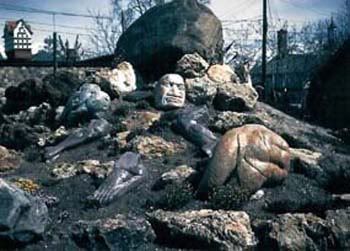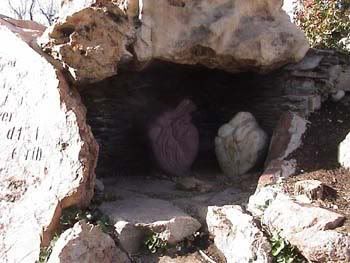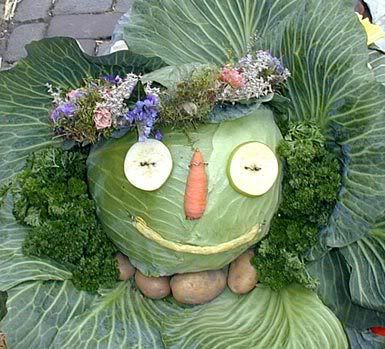I've been to the sculpture garden numerous times, almost all after dark, often requiring me to climb a fence. Once I had to stand on a garbage can to get over the top of the gate. I love the place. It's eerie and yet inspires me to think about God. Last time I went the brochures were actually in stock and it was all explained for me.
For those who are unaware of Gilgal Garden, it is to me the most interesting and unique thing to see in Salt Lake City. Some Mormons could easily find it disturbing rather than provoking. There's a sphinx with Joseph Smith's head on it. There's scriptures and poetry carved all over the stones. Most of the sc

riptures are from the Bible--the Old Testament, my favorite. I especially love the installation art piece for the second chapter of Daniel. It's placed on the side of a hill with different stones cut to represent the pieces of Nebuchadnezzar's dream (a rock cut out of the mountain, a tall warrior strewn about in pieces--the helmet, the breastplate, the leg, the feet).
Another favorite is a small "cave" that represents a verse from Malachi, about how the hearts of the children will turn to the hearts of the fathers--in the cave are 2 hearts, one white (for the dead) and one red

(for the living).
I like it because symbology is always fascinating. I took several classes on Maya art, theology, culture, and architecture at BYU. I loved learning how their sarcophaguses were painted red on the inside to represent the womb and therefore rebirth into heaven.
I also like it because this man was unafraid to make this art. He was a bishop for 19 years and starting scultping as a hobby when he was in his 50's. It may sound stupid that I admire his unabashed artistic expression, but it seems to be that a lot of Mormon artists may feel limited in the kind of work they can do. I of course can't speak for them, but I've steered away from a lot of Mormon fiction because the characters just didn't seem real at all--they never doubted, questioned, or struggled (there are exceptions of course). I've found that a lot of classic novels are far more religiously inspirational while at the same time they allow for the full exploration of faith and obedience.
But at Gilgal I kind of liked not knowing what all of the things stood for. I mean, sometimes I'd rather experience things purely sensually. It's fun to know how movies are made or who all the players involved really are--but what's most important is the experience it gives to me. I'm a fan of Whitman's poem "when I heard the learn'd astronomer"--because he spends an evening listening to an astronomer talk about the stars but doesn't really get much out of it until he just goes outside and walks beneath them.
Isn't that what's most important about people too? Not where they work, or what they've done, not their hobbies, but how they make you feel and how you make them feel? I love learning about others interests, but even if we have common interests, what matters is how they make me feel and how I make them feel.
Going to Gilgal garden makes me feel more in touch with the universe. I love to bring other people there, in hopes that they will feel the same thing.
 When I was in Japan one of my students gave me a box of 20 heads of lettuce for Christmas. The other teachers and I all ate some, but we had no idea what to do with the rest. Why didn't I think of doing something like this?
When I was in Japan one of my students gave me a box of 20 heads of lettuce for Christmas. The other teachers and I all ate some, but we had no idea what to do with the rest. Why didn't I think of doing something like this?




